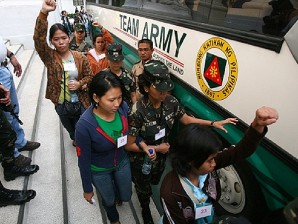
PROTEST CONTINUES. In this file photo, one of the 43 health workers arrested by the military in a raid in Morong raises a clenched fist as they are returned to their bus on their way to Camp Capinpin Detention facility in Tanay, Rizal. With the promotion of two military officers accused of torture, their quest for justice continues. INQUIRER FILE PHOTO
MANILA, Philippines—Health workers are protesting the recent promotion of two military officials accused of involvement in the torture of 43 health workers arrested in the town of Morong in Rizal province two years ago.
The Council for Health and Development pointed out that Lt. Gen. Jorge Segovia and Brig. Gen. Aurelio Baladlad are facing at least three cases of human rights violations.
“In view of the serious allegations of human rights and in view of the fact that several cases are pending before different bodies, we urge the Commission on Appointments not to confirm (but to) reject the appointment of the said officers,” the CHD said in a letter.
The letter appeared to be too late, however, as the two, along with more than 20 other generals, took their new oaths before President Aquino in Malacañang on May 8.
It was President Aquino himself who ordered the health workers’ release after he assumed office.
One of the signatories to the letter was Dr. Alexis Montes, one of the health workers now known collectively as the Morong 43.
In a press conference, CHD officials along with Montes and Mercy Castro, also a member of the Morong 43, denounced the promotion of Segovia and Baladlad despite the pending cases against them.
“It is very sad… they will try to promote them when they think no one is looking,” said Karapatan chairperson Marie Hilao-Enriquez, one of the signatories.
Another signatory, Dr. Eleanor Jara, lamented the recent promotion of Brig. Gen. Cristobal Zaragosa, whose appointment was confirmed by the Commission on Appointments in February.
“We were surprised to learn that he was promoted despite being one of the respondents in our cases,” she said.
Members of the Morong 43 have accused several officials of subjecting them to torture during their 2010 detention in Camp Capinpin, Tanay, Rizal. The camp is the headquarters of the Army’s 2nd Infantry Division.
In their letter to the Commission on Appointments, the health workers cited three pending cases against the officials.
A complaint for illegal arrest, detention and torture was filed at the Commission on Human Rights while a civil case involving former President Gloria Macapagal-Arroyo et al is pending before a Quezon City court.
A separate criminal complaint for violation of the Anti-Torture Law, robbery and child abuse was also lodged at the Department of Justice.
The letter to the Commission on Appointments also noted that the CHD’s volunteer doctors were among those barred from visiting the Morong 43 during the first few days of their detention.
“Also, an LCD projector owned by CHD and used during the First Responders Training was taken by the arresting officers and had not been returned,” the letter added.
Montes and Castro also belied the claims of five health workers who said the military did not torture them in 2010.
The five health workers, who are still held at the camp, even expressing willingness to testify in defense of the military at the DOJ’s investigation. They admitted being members of the New People’s Army and chose to stay as rebel returnees.
Montes, who claimed having difficulty sleeping as a psychological effect of his incarceration, urged their five members to “just tell the truth.”
“We are not angry at them. The people are eagerly waiting for their return to community service. We just want them to tell the truth,” he said.
“The five can deny all they want that they were not tortured. But they cannot speak for the rest of us,” he added.
Montes cited the affidavits of John Mark Barrientos, Valentino Paulino, Eleonor Orgena, Jenilyn Pizarro, and Chenelyn Tawagon, all executed on February 21, 2010 in the presence of a lawyer.
The affidavits detailed the circumstances of their arrest at a training seminar on February 6, 2010.
Castro added that the documents also pertained to the alleged torture that the five affiants suffered and that these affidavits were part of their complaint to the CHR.
She also cited a Dec. 11, 2010 column of Inquirer columnist Patricia Evangelista which quoted Segovia as saying most of the Morong 43 health workers were handcuffed, blindfolded and accompanied by soldiers even when going to the toilet.